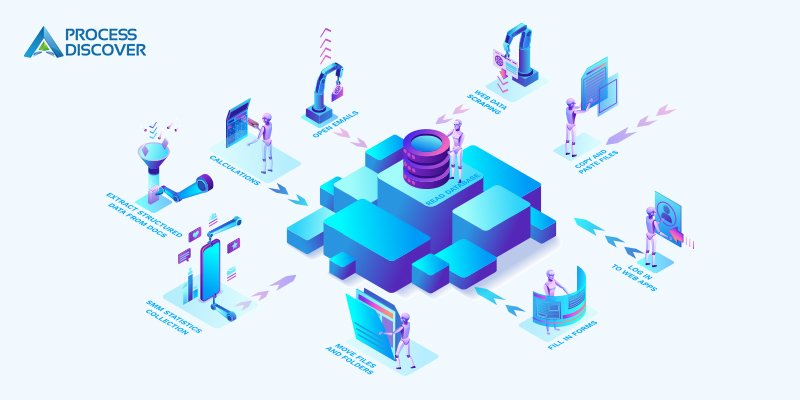Cloud computing and robotic process automation (RPA) are two of the most popular technological advancements of recent times. RPA allows businesses to automate repetitive tasks with the help of software tools in an optimized, error-free fashion. Cloud computing on the other hand offers location-independent computing services with the help of remote servers, databases, and so on.
Both cloud computing and RPA are incredible technologies independently, but when combined together, they become a supreme technological force to reckon with; especially to streamline your organization’s business processes.
This article gives you an overview of cloud RPA and discusses the benefits of integrating cloud RPA solutions into your business processes.
What is Cloud RPA?
Simply put, RPA on cloud is an amalgamation of two technologies. Cloud RPA delivers all of the agile features of RPA via the cloud’s capabilities. Traditionally, RPA applications were deployed as on-premise tools for enterprises. With the help of cloud foundation RPA, enterprises can take their on-premise software as it is and migrate the entire infrastructure to the cloud.
Cloud-based RPA enables enterprises to remain agile and tech-savvy. It allows businesses to scale rapidly and fuels the bottom-line. RPA cloud-native architecture significantly improves the pace at which enterprises can build, deploy, and manage applications.
Cloud RPA Benefits

RPA cloud solution offers several key benefits that businesses simply cannot look away from. In order to put things in perspective, here is a list of some of the benefits the RPA cloud service provides.
Ease of Implementation and Deployment
One of the key features of cloud computing with RPA is the ease of implementation and quick deployment of this technology. If enterprises ever hesitated to adopt automation throughout the organization, cloud RPA is the answer.
Cloud RPA removes the barrier to adopt automation by hosting and managing everything on a cloud. Unlike an on-premise solution, the installation of pre-built and optimized cloud services is easy and extremely fast. With just a few clicks, all of your automated processes can be moved to the cloud and deployed immediately. All you need is one-time setup assistance. All of your automation solutions can be instantly operated via a pre-built network segment. This significantly accelerates the existing automation process and reduces the need to have a large IT department for constant IT support and maintenance.
Low Infrastructure Costs

Another important benefit of RPA on the cloud is the massive cost reductions. The technology infrastructure required to install and maintain cloud RPA is significantly less compared to that of any on-premise enterprise solutions. According to an estimate by McKinsey & Company, enterprises can save up to 25% with the integration of cloud computing and RPA.
As previously discussed, the need for IT support becomes minimal or goes away entirely since there is no software client. This reduces the upfront cost of technical infrastructure and decreases the total cost of ownership (TCO) to a great extent.
Ease of Use
Cloud RPA tools are easy to use and in most cases don’t require any special training. In order to automate a business process, all you have to do is and choose the process that needs to be automated. If your enterprise already has a robust RPA in place, migrating to a cloud becomes easy.
Cloud RPA comes with an extremely intuitive interface that is optimized for users across different verticals and business functions. Features such as built-in product learning, specific design views for individual departments, and drag-and-drop AI features offer a rich interactive experience. All of this makes designing automation workflows very straight forward.
Remote Accessibility

Since there is no need to download and install software on your local devices, remote accessibility is the single biggest advantage of adopting cloud robotic process automation across business functions. A great example of cloud computing is email. Just like how email can be accessed from anywhere and from any device, all of your automation workflows can be accessed from virtually anywhere and on any device.
With the barrier of location out of the way, team collaborations become effective and seamless.
Data Protection and Safety
RPA and cloud offer a perfect hybrid solution for dual-delivery. The technology is subject to stringent regulatory compliance. Therefore, data extraction and migration are safe and error-free. The hybrid model keeps all of the data on-premises while automation can be executed on the cloud.
Scalability and Business Agility
Cloud RPA is a highly scalable business application. You can always start small by automating just a few business processes and scale up as your business and automation needs evolve. You don’t have to worry about additional computing resources to make this happen.
In addition to this, most of the cloud RPA tools are updated regularly; usually once every four weeks. You will have access to the latest software with regular and automatic updates. This will give you the bandwidth to work on innovative solutions and deploy new products at a much faster pace. You will have a technological edge over your competition.
Conclusion
Cloud capabilities combined with the intelligence of RPA can dramatically alter the business processes of any organization willing to embrace this technology.
While the management focuses on high-level strategic decisions, business functions that are operational and tactical can be automated with the help of cloud RPA tools.
With cloud RPA in place, enterprises can move fast, adapt, and grow at an unprecedented pace.

